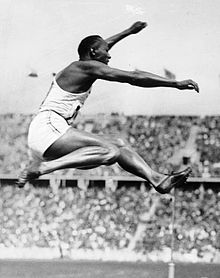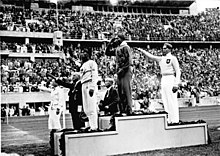Jesse Owens
Appearance
James Cleveland Owens (12 September 1913 – 31 March 1980) was an African-American athlete and civic leader; winner of 4 Gold medals in the 1936 Summer Olympics in Berlin, Germany; he used the name Jesse beginning in childhood, when he gave his name as "J.C. Owens" and was misheard.
Quotes
[edit]



decade unknown
[edit]- The road to the Olympics, leads to no city, no country. It goes far beyond New York or Moscow, ancient Greece or Nazi Germany. The road to the Olympics leads — in the end — to the best within us.
- As quoted in People In America : "Jesse Owens" by Barbara Dash on VOA (7 June 2002)
- It took a lot of courage for him to befriend me in front of Hitler... You can melt down all the medals and cups I have and they wouldn't be a plating on the 24-karat friendship I felt for Lutz Long at that moment. Hitler must have gone crazy watching us embrace. The sad part of the story is I never saw Long again. He was killed in World War II.
- On the congratulations given by German athlete Lutz Long, a competitor in the long jump, who in some accounts he credited with giving him some friendly advice that helped him to win against him; as quoted in "Owens pierced a myth" by Larry Schwartz in ESPN SportsCentury (2005)
- When I came back to my native country, after all the stories about Hitler, I couldn't ride in the front of the bus. I had to go to the back door. I couldn't live where I wanted. I wasn't invited to shake hands with Hitler, but I wasn't invited to the White House to shake hands with the President, either.
- As quoted in "Owens pierced a myth" (2005), by Larry Schwartz, ESPN SportsCentury
1930s
[edit]- Mr. Hitler had to leave the stadium early, but after winning I hurried up to the radio booth. When I passed near the Chancellor he arose, waved his hand at me and I waved back at him."
- Quoted in "Owens, Back, Gets Hearty Reception" by Louis Effrat, The New York Times, (August 25, 1936), p.25. Online for subscribers only.
- Hitler didn't snub me; it was our president who snubbed me. The president didn't even send me a telegram.
- About Franklin D. Roosevelt, as quoted in Triumph: The Untold Story of Jesse Owens and Hitler's Olympics (2007), by Jeremy Schaap, New York: Houghton Mifflin Harcourt, p. 211
1960
[edit]- I'm old now. It's all right.
- In response to Armin Hary's comment, "You smoke? That's no good. No good!" at the 1960 Olympics in Rome; as quoted in Rome 1960 (2008) by David Maraniss.
- Another old friend gone!
- Reported response to learning that his last remaining world record had been broken (31 December 1960); as quoted in Simpson’s Contemporary Quotations (1988) compiled by James B. Simpson
1970–1980
[edit]- The battles that count aren't the ones for gold medals. The struggles within yourself — the invisible, inevitable battles inside all of us — that's where it's at.
- As quoted in Blackthink: My Life as Black Man and White Man (1970)
- People say that it was degrading for an Olympic champion to run against a horse, but what was I supposed to do? I had four gold medals, but you can't eat four gold medals. There was no television, no big advertising, no endorsements then. Not for a black man, anyway.
- Interview (1971); also quoted in "Owens pierced a myth" by Larry Schwartz in ESPN SportsCentury
- I realized now that militancy in the best sense of the word was the only answer where the black man was concerned, that any black man who wasn't a militant in 1970 was either blind or a coward.
- I Have Changed (1972)
- Joe Louis and I were the first modern national sports figures who were black... But neither of us could do national advertising because the South wouldn't buy it. That was the social stigma we lived under.
- The Tampa Tribune (April 1, 1980)
Jesse Owens, Champion Athlete (1990)
[edit]- Quotations of Owens from Jesse Owens, Champion Athlete (1990) by Tony Gentry ISBN 0791083721
- We used to have a lot of fun. We never had any problems. We always ate. The fact that we didn't have steak? Who had steak?
- She was unusual because even though I knew her family was as poor as ours, nothing she said or did seemed touched by that. Or by prejudice. Or by anything the world said or did. It was as if she had something inside her that somehow made all that not count. I fell in love with her some the first time we ever talked, and a little bit more every time after that until I thought I couldn't love her more than I did. And when I felt that way, I asked her to marry me … and she said she would.
- On his wife, Minnie Ruth Solomon
- It all goes so fast, and character makes the difference when it's close.
- I wanted no part of politics. And I wasn't in Berlin to compete against any one athlete. The purpose of the Olympics, anyway, was to do your best. As I'd learned long ago... the only victory that counts is the one over yourself.
- To a sprinter, the hundred-yard dash is over in three seconds, not nine or ten. The first "second" is when you come out of the blocks. The next is when you look up and take your first few strides to attain gain position. By that time the race is actually about half over. The final "second" — the longest slice of time in the world for an athlete — is that last half of the race, when you really bear down and see what you're made of. It seems to take an eternity, yet is all over before you can think what's happening.
- I decided I wasn't going to come down. I was going to fly. I was going to stay up in the air forever.
- On his final record-breaking leap in the long-jump competition.
- It dawned on me with blinding brightness. I realized: I had jumped into another rare kind of stratosphere — one that only a handful of people in every generation are lucky enough to know.
- After I came home from the 1936 Olympics with my four medals, it became increasingly apparent that everyone was going to slap me on the back, want to shake my hand or have me up to their suite. But no one was going to offer me a job.
- It was bad enough to have toppled from the Olympic heights to make my living competing with animals. But the competition wasn't even fair. No man could beat a race horse, not even for 100 yards. … The secret is, first, get a thoroughbred horse because they are the most nervous animals on earth. Then get the biggest gun you can find and make sure the starter fires that big gun right by the nervous thoroughbred's ear.
- We'd get into these little towns and tell 'em to get out the fastest guy in town and Jesse Owens would spot him ten yards and beat him.
- People who worked with me or knew me still called me the "world's fastest human" because I almost never stopped. I'd found that I could get more done with no regular job or regular hours at all, but by being on my own, flying to speak here, help with a public relations campaign for some client there, tape my regular jazz radio show one morning at 5:00 a.m. before leaving on a plane for another city or another continent three hours later to preside over a major sporting event.
- It's like having a pet dog for a long time. You get attached to it, and when it dies you miss it.
- On having his world records beaten
- The black fist is a meaningless symbol. When you open it, you have nothing but fingers — weak, empty fingers. The only time the black fist has significance is when there's money inside. There's where the power lies.
- Said to Tommie Smith and John Carlos, who had given the black power salute while receiving their Olympic medals
Quotes about Owens
[edit]- Hitler Salutes Jesse Owens
- This athletic contest between the leading nations of the country, is a spectacle of spectacles! Its the greatest thing of its kind I've ever seen. Sunday, I witnessed 110,000 people cheer two Negro athletes, because they were supreme in their field. Monday, I saw another vast crowd of close to 100,000 people go "literally crazy" as they saw Jesse Owens, running with the effortless speed of an antelope, completely dominate his field to win "going away" in the 100 meters, with Ralph Metcalfe of Marquette University placing second. And then . . . wonder of wonders . . . I saw Herr Adolph Hitler, salute this lad. I looked on with a heart which beat proudly as the lad who was crowned king of the 100 meters event, get an ovation the like of which I have never heard before. I saw Jesse Owens greeted by the Grand Chancellor of this country as a brilliant sun peeped out through the clouds.
- I saw a vast crowd of some 85,000 or 90,000 people stand up and cheer him to the echo. And they were mostly Germans! Make no mistake about it. These German people are mighty fine. They have a spirit of sportsmanship and fair play which overrides the color-barrier. This week, as Negro athletes have sent the Stars and Stripes of the United States shooting to the top of the flag-pole on three different occasions, I have observed the spirit, not only of the German people, but of those competing from foreign countries. And I've found out, that in the world of sport, where personal perfection is the measuring rod of achievement, color does not count.
- African-American U.S. journalist Robert L. Vann about witnessing Hitler salute Owens, something Owens also spoke about [see 1930s section above]. "Hitler Salutes Jesse Owens", [Pittsburgh Courier], 8 August 1936, p.1; partially quoted in Jeremy Schaap, Triumph: The Untold Story of Jesse Owens and Hitler's Olympics, NYC: Houghton Mifflin Co., 2007, p.194.
- The real snub of Owens came from his own president. Even after ticker-tape parades for Owens in New York City and Cleveland, President Franklin D. Roosevelt never publicly acknowledged Owens' achievements. Gold in the 100 meter, 200 meter, 400 meter relay, and long jump. Owens was never invited to the White House and never even received a letter of congratulations from the president. Almost two decades passed before another American president, Dwight D. Eisenhower, honored Owens by naming him 'Ambassador of Sports'. In 1955.
- "German Myth 10: The 1936 Berlin Olympics, Hitler, and Jesse Owens" (10 June 2004), German Misnomers, Myths and Mistakes, About, Inc
- You smoke? That's no good. No good!
- Armin Hary, at the 1960 Olympics in Rome, as quoted in Rome 1960 (2008) by David Maraniss


